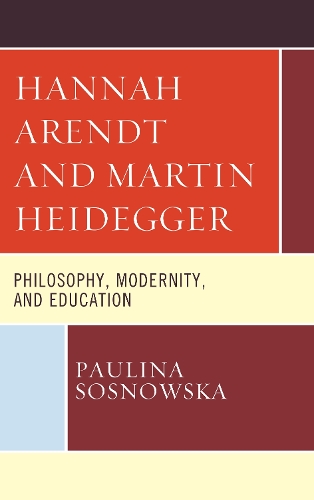
Hannah Arendt and Martin Heidegger: Philosophy, Modernity, and Education
(Hardback)
Available Formats
Publishing Details
Hannah Arendt and Martin Heidegger: Philosophy, Modernity, and Education
By (Author) Paulina Sosnowska
Bloomsbury Publishing PLC
Lexington Books
15th July 2019
United States
Classifications
Professional and Scholarly
Non Fiction
320.0922
Physical Properties
Hardback
250
Width 160mm, Height 228mm, Spine 24mm
549g
Description
The drama of totalitarianism, one of the most important turns in the modern philosophy and history of the West undergirds the intellectual relationship between Martin Heidegger and Hannah Arendt. The rise of totalitarianism caused the disruption of traditional metaphysical and political categories and the necessity of a painstaking forging of new languages for the description of reality. This book argues that Arendts answer to Heideggers philosophy, intelligible only within the wider context of both thinkers struggles with the philosophical tradition of the West, also opens up a new horizon of conceptualizing the relationship between philosophy and education. Arendt's answer is a development of her thesis of the broken thread of tradition, situated in the wider context of Heideggerian philosophy and his entanglement with Nazism that questions the traditional relationship between philosophy and education. The final parts of this book return to the problem of dialogue between philosophy, thinking, and university education in times when the political and ethical framework is no longer determined by the continuity of tradition, but the caesura of 20th-century totalitarianism.
Reviews
A highly informative and innovative journey through complex relations between philosophy and politics, where the density of philosophical argument is interwoven with accounts on the difficult relations between Arendt and Heidegger: two eminent thinkers who took dramatically different positions against the most tragic challenge of the twentieth century. Against this background, Paulina Sosnowska traces the transformations of the pedagogical promise of philosophy, from that of freedom in ancient paideia, through individuality in modern Bildung, to autonomy in Heideggers fundamental ontology. Hannah Arendt, as being faithful and unfaithful to Heidegger, initiates a new version of that promise. Convincingly interpreted as foretelling Foucaults and Agambens critique of biopolitics, she calls for critique and thinking as disruptive to metaphysical and political totality. Weak as it appears to be, thinking has an immanent educational and ethical power, even if it does not have an immediate impact on social reality a message that must be read as significant in the time when temptations to totalitarianism re-emerge globally. -- Tomasz Szkudlarek, University of Gdansk
Author Bio
Paulina Sosnowska is assistant professor at Warsaw University.
